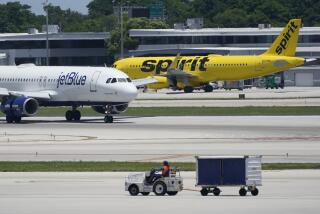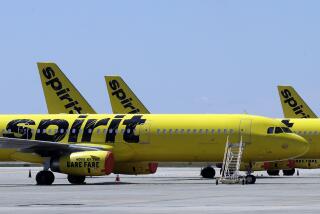Delta Will Buy Western in $860-Million Airline Deal
- Share via
NEW YORK — In a deal valued at about $860 million, Delta Air Lines will buy Los Angeles-based Western Airlines, the nation’s oldest scheduled air carrier, the two companies announced Tuesday.
Western, which celebrated its 60th birthday in April, used open-cockpit, single-engine planes on its first route--from Los Angeles to Salt Lake City via Las Vegas. It gave Los Angeles its first transcontinental air service and put Southern California on the air mail map. Its name will presumably disappear in about a year when the merger is completed.
Delta, founded in 1929, is the nation’s sixth-largest airline in terms of revenue passenger miles, while Western ranks ninth. When they combine, the new entity will fly more than 40 billion revenue passenger miles a year, putting it in fourth place behind a merged Texas Air Corp.-Eastern Airlines, United Airlines and American Airlines.
The proposed merger, announced here after a meeting of Western’s board, comes during a period of intense consolidation in the airline industry. In the last 12 months, Northwest Orient Airlines and Republic Airlines have merged; Pan American World Airlines sold its Pacific routes to United Airlines, and Trans World Airlines and Ozark Airlines began the process of merging.
The merger of Texas Air and Eastern, which has been temporarily held up by the Department of Transportation, is expected to be approved ultimately, creating the nation’s largest carrier. In another major deal, People Express Airlines bought Frontier Airlines and then recently put it into bankruptcy.
According to Airline Economics Inc., a Washington, D.C., consulting firm, once all of the proposed mergers have been completed, the nation’s major airlines combined will share 71% of the airline market compared to the 59% they had as individual airlines.
Delta is a strong airline with the best balance sheet in the industry and a modern fleet of cost-efficient jets.
Return to Profits
Western had a dramatic turnaround last year after a five-year period--from 1980 through 1984--of losses. Although Western will initially be operated as a wholly owned subsidiary of Delta, the operations of the two carriers will be combined within a year of the completion of the transaction, the carriers said in a joint statement.
The only possible stumbling block to the merger might come from labor. While Delta has only one union, the pilots, Western is fully unionized.
Marv Griswold, principal officer of Teamsters Local 2707, which represents 1,600 Western mechanics, stock clerks, fuelers and flight instructors in Los Angeles, said those employees are “fully protected” by their labor contracts against such things as layoffs and unfair loss of seniority because of a merger.
Representatives of the other unions involved were not available for comment.
Called a Good Fit
Airline observers generally applauded the proposed Delta-Western merger. “It is a very positive fit,” said Scott Drysdale, airline analyst with the Seattle office of Birr, Wilson & Co., a San Francisco brokerage firm. “The operating synergies will be excellent.”
David Sylvester, airline analyst with the San Francisco brokerage of Montgomery Securities, said Delta is making an excellent buy.
“Western is a financially clean company,” he said. “It has $200 million in cash in the till and only $150 million in long-term debts.” He added that Western is second only to United in the number of airport gates on the West Coast and in the Rocky Mountain states--78 next to United’s 127.
Delta, headquartered in Atlanta, has most of its routes in the South but also flies to several West Coast airports, including Los Angeles International. It operates international flights to Britain, Canada, Bermuda, the Bahamas, West Germany, Ireland and France.
Focus in the West
Western, which concentrates on the Western United States, has its major hub in Salt Lake City. Its main international routes are to various points in Mexico.
The proposed merger is expected to face no opposition on antitrust grounds by the Justice Department or by the Department of Transportation, which must give final approval. The airlines overlap on only two routes--between Salt Lake City and Dallas-Forth Worth and between Portland, Ore., and Salt Lake City.
It has been rumored several times in the last six months that Delta would become a suitor for Western. Earlier this year, the Western stock was hotly traded on merger rumors. But Western Chairman Gerald Grinstein indicated in an April interview that his airline wanted to go it alone.
Nevertheless, analysts had been saying for months that both Western and Delta would have to become part of the consolidation pattern. They said that Delta might get “left behind” as other major carriers grew through mergers.
National Impact
A combination with Western, these observers said, would give Delta a presence in the West and allow it to become national in character. Western, they insisted, would not be able to fight off some kind of an acquisition much longer.
“It is a realistic merger,” said Robert J. Joedicke, airline analyst with Shearson Lehman Bros. of New York. “It makes a great deal of sense. It should have no government opposition. It will help make Delta a full-service, nationwide carrier competing with American and United in the Rocky Mountain states and on the West Coast.”
One knowledgeable source close to the transaction said officials of the two airlines had been holding negotiations for three weeks but there was no public hint of a deal until Western announced Tuesday that an offer had been made. Shortly thereafter, the airlines announced jointly that they had agreed to merge.
Western stock was the most active issue Tuesday on the New York Stock Exchange, closing at $11.625, up $1.50, on volume of more than 4.3 million shares. Delta closed at $42.125, unchanged, on volume of 72,900 shares.
Terms of Agreement
Under terms of the agreement, which has been approved by the boards of both carriers, Western shareholders will receive $6.25 in cash, plus securities worth an equal amount, for each common share.
Analysts’ estimates that the offer is worth $860 million are based on Western’s 51.2 million common shares outstanding and more than 14 million convertible preferred shares and stock options.
The shareholders of both airlines and the regulatory agencies must approve the transaction.
Based on several news interviews, employees of both airlines seemed to favor the proposal.
“We’ve been waiting for this for some time,” said Robin Drogin, a Delta passenger sales representative in New York. “We needed the expansion. Everybody is excited.”
Employees’ Viewpoint
Libby Brown, a customer service representative at Delta’s downtown Los Angeles ticket office, said both Delta’s and Western’s employees “are satisfied with the merger. These are two good airlines,” she said. “I haven’t heard anything negative about it.”
Across the street at the Western ticket office, “it’s business as usual,” said customer service representative Bette Harmor. “We’re both very nice airlines,” she said.
Renee Jones, a reservations agent at Western’s office near Los Angeles International Airport, said, “As far as I’m concerned, it’s great. They (Delta) pay more for one thing, their benefits are better and they’re a good company.”
However, “Some of the newer people like me are worried about being laid off,” she said. “Western has a lot of employees and they may not want to keep everyone.”
Times staff writer Nancy Rivera Brooks in Los Angeles contributed to this story.
THE MERGER AT A GLANCE
DELTA AIR LINES
1984 1985 Revenues (in billions) $4.264 $4.684 Net income (in millions) $176 $259
Assets: $614 million Employees: 39,000 Airports served: 96 Fleet: 254 airliners
WESTERN AIRLINES 1984 1985 Revenues (in billions) $1.182 $1.307 Net income (in millions) -$29.2 $35.5
Assets: $413 million Employees: 10,000 Airports served: 67 Fleet: 89 airliners
More to Read
Inside the business of entertainment
The Wide Shot brings you news, analysis and insights on everything from streaming wars to production — and what it all means for the future.
You may occasionally receive promotional content from the Los Angeles Times.










